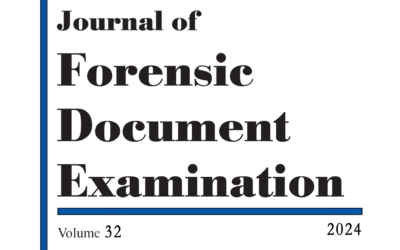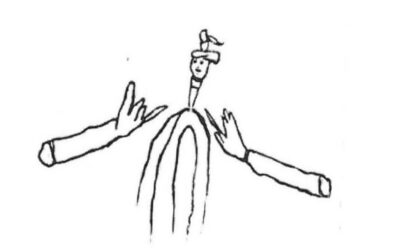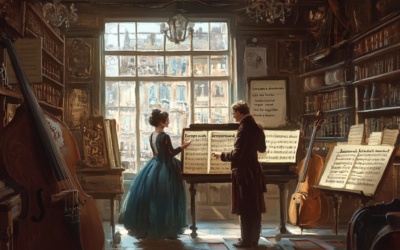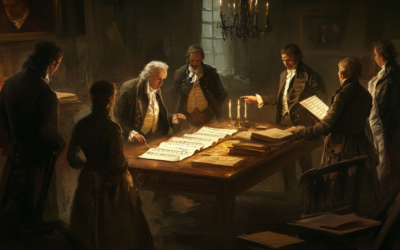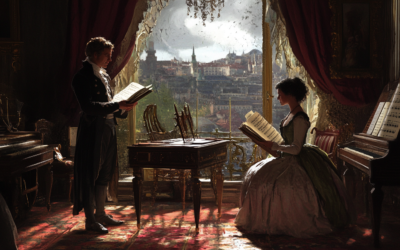Mozart’s Training
The Myth of Genius Shattered
The myth of Mozart’s genius is nothing more than a carefully crafted illusion, propped up by misplaced attributions and romanticised biographies. Behind his so-called brilliance lies the reality of his father’s dominating influence and a lack of formal education.
Mozart: The Fall of the Gods
This book offers a fresh and critical look at the life of Wolfgang Amadeus Mozart, challenging the myths that have surrounded him for centuries. We strip away the romanticised image of the “natural genius” and delve into the contradictions within Mozart’s extensive biographies. Backed by nearly 2,000 meticulously sourced citations, this work invites readers to explore a deeper, more complex understanding of Mozart. Perfect for those who wish to question the traditional narrative, this biography is a must-read for serious music lovers and historians.
"Mozart’s so-called maturation as a composer was more a product of Leopold’s craft than any external influence."
Mozart: The Fall of the Gods
When it comes to Wolfgang Amadeus Mozart, the myth of innate genius has been perpetuated for centuries. But if we strip away the romanticism and look at the facts, a different picture begins to emerge. Far from being a natural-born prodigy, Mozart’s musical abilities were meticulously shaped under the strict and controlling hand of his father, Leopold, and not by some divine inspiration or natural talent.
Mozart’s education was far from conventional. Unlike his father, who received a formal education at the hands of Jesuits, Amadé never attended school. He didn’t have systematic lessons in harmony, counterpoint, or fugue, nor did he benefit from the intellectual and musical training that other musicians of his time received in colleges or religious institutions. His schooling was entirely confined to his father’s relentless tutelage. Yet, for years, biographers have attempted to place Wolfgang under the tutelage of prestigious teachers like Padre Giovanni Battista Martini, despite the glaring lack of evidence.
Martini was a celebrated teacher, whose influence has been exaggerated in Mozart’s case. Theories linking Martini’s teaching to Mozart’s compositions have persisted for years. Musicologists have even gone so far as to analyse Wolfgang’s works before and after his visit to Bologna in 1770 to ‘prove’ the supposed influence of the famed didact. Yet, closer examination reveals these claims to be weak at best. It wasn’t Martini’s guidance that shaped Mozart’s sacred music, but rather the hand of his father.
Mozart’s masses, such as the K.115 and K.116, once hailed as evidence of his development under Martini, have since been attributed to Leopold, not Wolfgang. The more closely we examine the so-called “masterpieces” of Mozart, the more the cracks begin to show. The most embarrassing realisation, however, is that for all of Wolfgang’s supposed “originality,” his most lauded works in sacred music were little more than compositions reworked from his father’s drafts.
In fact, in 1953, Karl Pfannhauser discovered that the Kyrie K.221, Lacrimosa K.Anh.21, and another untitled fragment came from Johann Ernst Eberlin’s Requiem in C Major, a piece once very popular in Austria and certainly admired by the Mozarts. For many years, it was believed that Wolfgang had copied Eberlin’s Lacrimosa, omitting the nine-bar orchestral introduction. However, in 1961, Wolfgang Plath confirmed that all three pieces had actually been copied by Leopold, not Wolfgang. The 1964 Köchel catalogue still included these works under Mozart’s name, but classified them as music that Wolfgang had copied from other composers. Further evidence found after World War II confirmed beyond doubt that the Kyrie K.221 was indeed copied by Leopold.
In reality, the notion that Mozart’s church music owed anything significant to Martini is a fabrication. Wolfgang’s so-called maturation as a composer was more a product of Leopold’s craft than any external influence. This becomes particularly evident in the way Mozart mirrored the style of his father’s compositions and even used entire sections of his father’s work in his own pieces, like the K.115. The narrative that Mozart became “autonomous” through Martini’s teaching is, in fact, a convenient fantasy.
You May Also Like
Unveiling the Truth Behind Mozart’s Thematic Catalogue
Anna Trombetta, Professor Martin W. B. Jarvis from Charles Darwin University, and Luca Bianchini, have published a peer-reviewed article titled Unveiling a New Sophisticated Ink Analysis Technique, and Digital Image Processing: A Forensic Examination of Mozart’s Thematic Catalogue. This research, which underwent an extensive double-blind peer review, has appeared in a journal that serves as a global reference point for forensic document examiners and court specialists.
Unveiling the Truth Behind the Drawing
H. S. Brockmeyer’s latest research unravels the mystery behind a July 5, 1791, letter from Mozart to his wife. This remarkable investigation uncovers the original, unembellished drawing Mozart included—vastly different from the altered version widely reproduced in collections today. The discovery raises significant questions about historical accuracy and the intentional shaping of Mozart’s legacy.
The Deceptive Nature of Mozart’s Catalogue
The Thematic Catalogue traditionally credited to Mozart is fraught with inaccuracies, suggesting that many of his famous works might not be his at all. This prompts a necessary reevaluation of Mozart’s legacy and the authenticity of his compositions.
The Mozart Myth Unveiled: A Deeper Look
Mozart’s legacy is far from the untarnished narrative of genius that history would have us believe. The web of deceit woven around his name by those closest to him, including his own widow, reveals a much darker story.
The Other Side of Mozart’s Legacy
Explore the untold story of Mozart, where myth and reality collide. Our critical examination of his life and works reveals a legacy shaped by profit, myth-making, and misattribution. Join us in uncovering the truth behind the man and his music.
The Deception Surrounding Mozart’s Legacy
Anton Eberl’s confrontation with Constanze in 1798 exposed a web of deceit surrounding Mozart’s legacy, revealing that several of his compositions were falsely attributed to the late composer. This chapter uncovers the ethical dilemmas and controversies that have marred the posthumous reputation of one of history’s most celebrated musicians.


